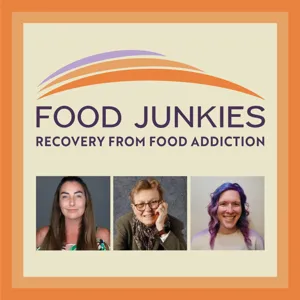Podcast Summary
Ultra processed foods can be addictive: Ultra processed foods, designed to trigger 'bliss points', can lead to compulsive eating and health issues, with 66% of US kids and teens' calories coming from these foods. Research continues on food addiction's causes and effects.
Ultra processed foods, which are industrial creations with long ingredient lists that resemble chemical experiments more than natural foods, have the potential to be addictive. These foods are designed to trigger our "bliss points," making us crave more and more, while not satisfying our hunger like real foods. Food addiction isn't an all-or-nothing condition; it exists on a spectrum, with some people able to moderate their consumption and others consuming in a compulsive, out-of-control way that impairs their health and wellbeing. The evidence for food addiction is growing, and it's important to understand the potential risks, especially given that two-thirds of the calories consumed by kids and teens in the US come from ultra processed foods. While not all researchers agree, the similarities between addictive and eating behaviors, and the ways food advertising and development of food preferences in infants contribute to this issue, are areas of ongoing research.
1 in 8 adults and 1 in 10 children show signs of food addiction: Food addiction affects a significant number of people, causing emotional and physical issues, impaired social engagements, and decreased focus, with parallels to substance addiction
Food addiction is a real issue affecting a significant number of adults and children. Using diagnostic criteria for substance addiction and applying it to highly processed foods, researchers estimate that about 14% of adults and 12% of children exhibit signs of food addiction. This is concerning as children are often exposed to these foods at a young age and aggressively marketed to, potentially setting them up for a lifetime of struggles with food addiction. The consequences can include emotional and physical problems, impaired social engagements, health issues, and decreased ability to focus at work or school. The parallels with substance addiction, such as loss of control, intense cravings, and negative impacts on important areas of life, highlight the seriousness of this issue.
Family history of addiction increases risk of food addiction: People with a family history of addiction may be more likely to develop problematic relationships with food, and highly processed foods can be addictive due to their rapid delivery of refined carbs, fats, and salts.
Our food environment can contribute to addictive behaviors, particularly for those with a family history of addiction. A recent study published in the APA Journal of Psychology of Addictive Behaviors found that a family history of problematic alcohol intake increases the risk of food addiction. This suggests that individuals with a family history of addiction may be at heightened risk for developing problematic relationships with food. The study also found that people who show compulsive addictive patterns with highly processed foods are at higher risk for personal alcohol problems and smoking/vaping. The field is still debating the best terms to describe highly processed foods, but in general, highly processed foods include refined carbohydrates and added fats. Even homemade bread made with refined flour and added fats can be considered highly processed and deliver reinforcing refined carbohydrates, fats, and salts to the body rapidly, making it potentially addictive.
Highly processed foods can cause withdrawal symptoms: Recognizing potential withdrawal symptoms from highly processed foods can help individuals make sustainable dietary changes
Highly processed foods can be addictive, leading to withdrawal symptoms similar to those experienced when quitting cigarettes, alcohol, or drugs. These symptoms include irritability, anxiety, cravings, and difficulty focusing. The peak of these symptoms typically occurs around 3 to 5 days after cutting down on highly processed foods, and they can make it challenging for individuals to stick to dietary changes. Parents have reported similar experiences when trying to reduce their children's intake of these foods. While more research is needed to fully understand and effectively treat food addiction, recognizing the potential for withdrawal symptoms is an important step in supporting individuals in making sustainable dietary changes.
Understanding Emotions and Triggers in Food Addiction: Identifying emotions and developing healthier ways to regulate them is crucial in managing food intake and addiction. Managing triggers and using medications can help individuals gain control over food addiction, and even those with anorexia nervosa can exhibit addictive eating behaviors.
There are strong connections between addictive behaviors, such as those related to food, and traditional substance addictions. Identifying emotions and developing healthier ways to regulate them is crucial in managing food intake and addiction. Understanding and managing triggers, like certain times of day or people, can help individuals gain control. Medications and focusing on regular, high-quality meals can also be effective interventions. Interestingly, being hungry can make individuals more vulnerable to both highly processed food cues and traditional addictive substances. In the case of bulimia nervosa, up to 80-90% of individuals report addictive behaviors related to food. Even those with anorexia nervosa, binge-purge subtype, who aren't consuming large amounts of food, can experience a loss of control and endorse addictive eating. The parallels between food addiction and traditional substance addictions are becoming increasingly clear.
Understanding Food Addiction in Anorexia: Food addiction in anorexia is prevalent and complex, requiring more attention and understanding. Acknowledging food as an addictive behavior can reduce stigma and help address individuals with problematic eating behaviors.
Food addiction, specifically in the context of anorexia, is a complex issue that requires more attention and understanding. While it may overlap with other eating disorders like binge eating disorder and bulimia, the prevalence of food addiction is much higher. This means that many individuals with problematic eating behaviors are not being addressed or treated. It's important to recognize and attend to these individuals as they are more likely to have lower qualities of life and higher psychopathology. Additionally, discussing food and eating as addictive behaviors does not necessarily increase stigma towards individuals with higher weight. In fact, it may even help reduce stigma by acknowledging the role of the food industry in designing highly processed foods that trigger addictive behaviors. For parents, the best approach to feeding young children is still an area that requires more research. However, it's important to note that restricting or forbidding highly processed foods may not necessarily lead to the development of restrictive eating disorders. Instead, parents can focus on providing a balanced and varied diet while also teaching healthy eating habits.
Balancing Parental Control and Societal Change for Healthier Food Choices: Parents should guide children's food intake but societal changes and regulations, like restricting ads and increasing taxes, are also needed for healthier food choices.
While parents play a role in regulating their children's intake of highly processed foods, it's a complex issue that requires a middle ground approach. Extreme restrictions or lack of guidelines can lead to problems. The comparison is drawn between the public health crisis of excessive intake of highly processed foods and tobacco addiction. Solutions lie in broader societal changes and regulations, such as restricting advertising to children, increasing taxation, and public efforts to change attitudes towards these foods. Chile and the UK have taken the lead in implementing such policies, while America lags behind. As scientists, it's important to acknowledge that there's no one-size-fits-all answer and to be kinder to parents as they navigate this issue. Ultimately, a balanced approach to food consumption, with real food as the default, is recommended.
Marketing tactics of Big Tobacco used in promoting ultra processed foods: Highly processed foods can trigger addictive responses due to their ability to cause loss of control, intense cravings, and continued use despite negative consequences, similar to tobacco.
The marketing tactics used by Big Tobacco in the past to promote ultra processed foods, such as targeting children and racial ethnic minorities, denying negative health consequences, and funding scientists and politicians, have contributed to the addictive nature of these foods. While there is ongoing debate among researchers about whether food can be addictive, there is growing consensus that highly processed foods can trigger addictive responses due to their ability to cause loss of control, intense cravings, and continued use despite negative consequences. The debate now focuses on the role of the food itself and the identification of specific addictive agents. However, the compulsive consumption of highly processed foods suggests that these foods are an essential ingredient in the addictive response. The benchmarks used to evaluate tobacco as addictive, such as compulsive use, high reinforcement, and mood change, can also be applied to highly processed foods. The ongoing research should focus on filling the gaps in our knowledge and understanding the role of food in addiction.
Processed foods can be as addictive as substances: Processed foods, with their high sugar and fat content, trigger dopamine release similar to addictive substances, making them hard to resist and potentially leading to addiction and health issues like obesity.
Highly processed foods, which contain sugars and fats, trigger the same amount of dopamine release in the brain as addictive substances like nicotine and alcohol. This is why these foods can be as addictive as substances, despite not having a single identifiable addictive substance like nicotine. The way these foods are processed and the presence of additives amplify their addictive properties. The complexity of eating makes it harder to identify food addiction, but the consequences of our relationship with these foods are significant, with obesity and related conditions being a leading cause of preventable death in the US. The delivery method, dose, and rapidity of the intake of these substances in processed foods, combined with risk factors like a family history of addiction or trauma, make individuals more vulnerable to developing an unhealthy relationship with these foods.
Understanding the Role of Mental Health in Our Lives: The APA promotes mental health and well-being through resources and initiatives, emphasizing the importance of seeking professional help and practicing self-care.
Learning from this episode of Speaking of Psychology is the importance of understanding the role of mental health in our lives. The American Psychological Association (APA) plays a crucial part in promoting mental health and well-being. The APA produces various resources and initiatives to help individuals cope with various challenges, from stress management to addressing social issues. Our discussion touched upon the importance of seeking professional help when needed and the benefits of practicing self-care. Remember, taking care of your mental health is just as important as taking care of your physical health. So, don't hesitate to reach out for support and prioritize your well-being. Thank you for tuning in to Speaking of Psychology, and we'll be back with more insights and information on all things psychology.




